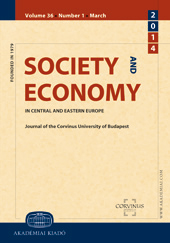Institutions and transition: lessons and surprises
Institutions and transition: lessons and surprises
Author(s): Paul G. HareSubject(s): National Economy, Developing nations, Political economy, Economic development, EU-Accession / EU-DEvelopment
Published by: Akadémiai Kiadó
Keywords: transition economies; property rights; Eastern Europe; political economy;
Summary/Abstract: This paper starts with some definitions and concepts to clarify what we have in mind when we talk about economic institutions and the political economy of transition. Much discussion of the area is characterised by ambiguity and confusion, and while there are many partial theories of institutions covering specific cases, we still lack an all encompassing theory. The institutions important for transition are introduced next, this discussion helping to make clear the critical distinction between institutions per se, and the concrete organisational and legal forms through which they are implemented in particular country settings. For those transition economies that have already joined, or wish to join the EU, this includes some remarks on the acquis communautaire. Some empirical evidence on the role of institutions in facilitating transition and fostering post-socialist economic growth is then reviewed, finding support for the rule of law, secure property rights (ownership and business contracts) and liberal trade. As an aside to the main argument, a brief account of possible directions of institutional reform in North Korea is presented. Finally, the concluding section outlines what transition has taught us about the roles of institutions in economic life, and highlights some important unsettled issues, including the problem of embedding new institutions in different cultural settings.
Journal: Society and Economy. In Central and Eastern Europe ǀ Journal of the Corvinus University of Budapest
- Issue Year: 35/2013
- Issue No: 1
- Page Range: 1-24
- Page Count: 24
- Language: English

